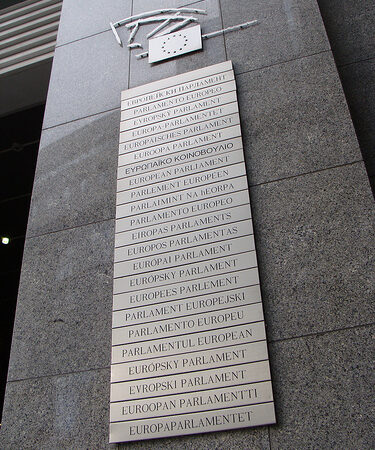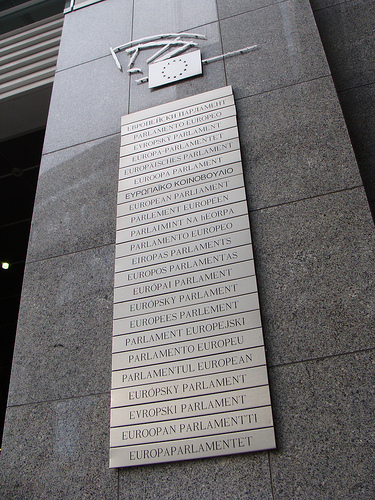A response to Denis MacShane’s CER essay: national parliaments are not the route to EU legitimacy

 Denis MacShane has written an essay entitled “Europe’s parliament: Reform or perish?”, a paper which he says is a contribution to the debate about the future of the European Parliament started by Andrew Duff, Julian Priestley, and Anand Menon and John Peet.
Denis MacShane has written an essay entitled “Europe’s parliament: Reform or perish?”, a paper which he says is a contribution to the debate about the future of the European Parliament started by Andrew Duff, Julian Priestley, and Anand Menon and John Peet.
MacShane tries to take a position in which national parliaments should be placed at the centre of the EU’s democratic legitimacy, contrary to the positions of Duff and Priestley. The problem is that his argument is weak and incoherent, and he contradicts himself even within his own essay. Perhaps as he’s a member of parliament he doesn’t have to meet the more exacting intellectual standards of other CER authors?
MacShane starts his piece with a typical critique of the European Parliament – that turnout is going down election after election. He of course fails to mention that all election turnouts, at all levels, are on a downward trajectory across Europe, admittedly from different starting points.
He even poses the question “But if it is not a state why does it need a legislature?” Well Denis, the EU does make law, and how else are we to achieve democratic legitimacy for that process if the EU doesn’t have a democratically elected legislature?
He then goes on to have a rant at the odd composition of the European Parliament. Here he cites the French PS example, about the only one he seems to know, ignoring the better quality of MEPs from the French Greens, and also failing to make the comparison between countries that have open lists to elect MEPs rather than closed lists. The closed list, regional PR system in use to elect the UK’s MEPs is the worst possible election system, and yet reforming it doesn’t even warrant a mention from MacShane! More on that issue here.
The essay then moves to look at the relationship between the European Parliament and national parliaments:
As national parliamentarians feel patronised by or excluded from European law-making and decision-making, they find it easier to take refuge in assertions of national sovereignty. The more MEPs insist on their power, the more they generate resentment from national MPs who see the EP as a rival and opponent to be curbed or opposed rather than in terms of cooperation and complementarity.
Seriously? The European Parliament is to blame for this?
Undoubtedly the process of European integration has limited the power of national parliamentarians, but – lest we forget – the primary legislative body in the EU remains the Council of the European Union and – importantly – national parliaments, with the exception of only Denmark and Finland, have been useless at holding their ministers to account before they head off to Council meetings.
Contradicting himself, this is a point that MacShane readily accepts:
As it stands, the Commons appears incapable or unwilling to organise its work so that EU policy gets mature consideration, apart from the pro- and anti-EU knockabout which fills most of the debating time on Europe […] The UK government’s decision to abolish the bi-annual European debate held before each main EU Council meeting is also regrettable.
How then, if national parliaments have proven themselves inadequate and incapable of looking at EU matters, is greater involvement going to help? I’ve examined that issue in depth in a previous post.
It seems that MacShane has come to this conclusion for no reason other than some outdated notion of national sovereignty, or ‘all politics is national’ as he says. Seems he has forgotten about devolution that Labour introduced and notions of multiple levels of identity. The idea that we all have to feel part of a nation in order to feel part of the EU is outdated and undesirable; we have multiple levels of identity, some stronger, some weaker, and that is a good thing. More on that issue here.
MacShane has a few further half-baked ideas – that the EP should be elected by thirds to prevent it being a tool to bash national governments of a different political persuasion (is he unaware that the EP has a centre-right majority, and most Member States are controlled by the centre right?), and that there should be a second chamber of the EP nominated from national parliaments (who would want to sit there? Costs?).
“Should we not start from the nations of the EU in the search for greater European political and parliamentary legitimacy?” he asks. Well Denis, the representation of the nations of Europe is achieved in the Council of the European Union, and national parliaments should preoccupy themselves with keeping national ministers to account first of all.
Here’s an idea Denis: how about the representation of the people of Europe? That’s the direction the European Parliament should look for reform. It’s understandable for people to not turn up to vote in EP elections if they cannot clearly see what will change as a result of their vote. That the direction of European integration does not depend on the composition of the European Parliament. That party lists are closed and are an internal stitch up. That MEPs get involved in cash for laws scandals*, and it’s not clear what’s being done in the name of citizens or in the name of business interests.
In short MacShane is right that reform of the European Parliament is needed. But the questions he raises and the partial solutions he proposes are incoherent, unworkable and undesirable.
* – of course MacShane’s own behaviour is less than exemplary in this regard
Changing the powers of the elected institutions in the EU is not going to confer democratic legitimacy.
What is needed is for there to be a rough consensus amongst the generality of the population in each Member State, that they are prepared to be bound by the decisions of an EU-wide majority in the areas with which the EU concerns itself. The EU is hopelessly short of this sort of legitimacy.
To argue that this *isn’t* necessary puts one on the opposite side from Home Rule in 1918, and on the Tory side in the American Revolution.